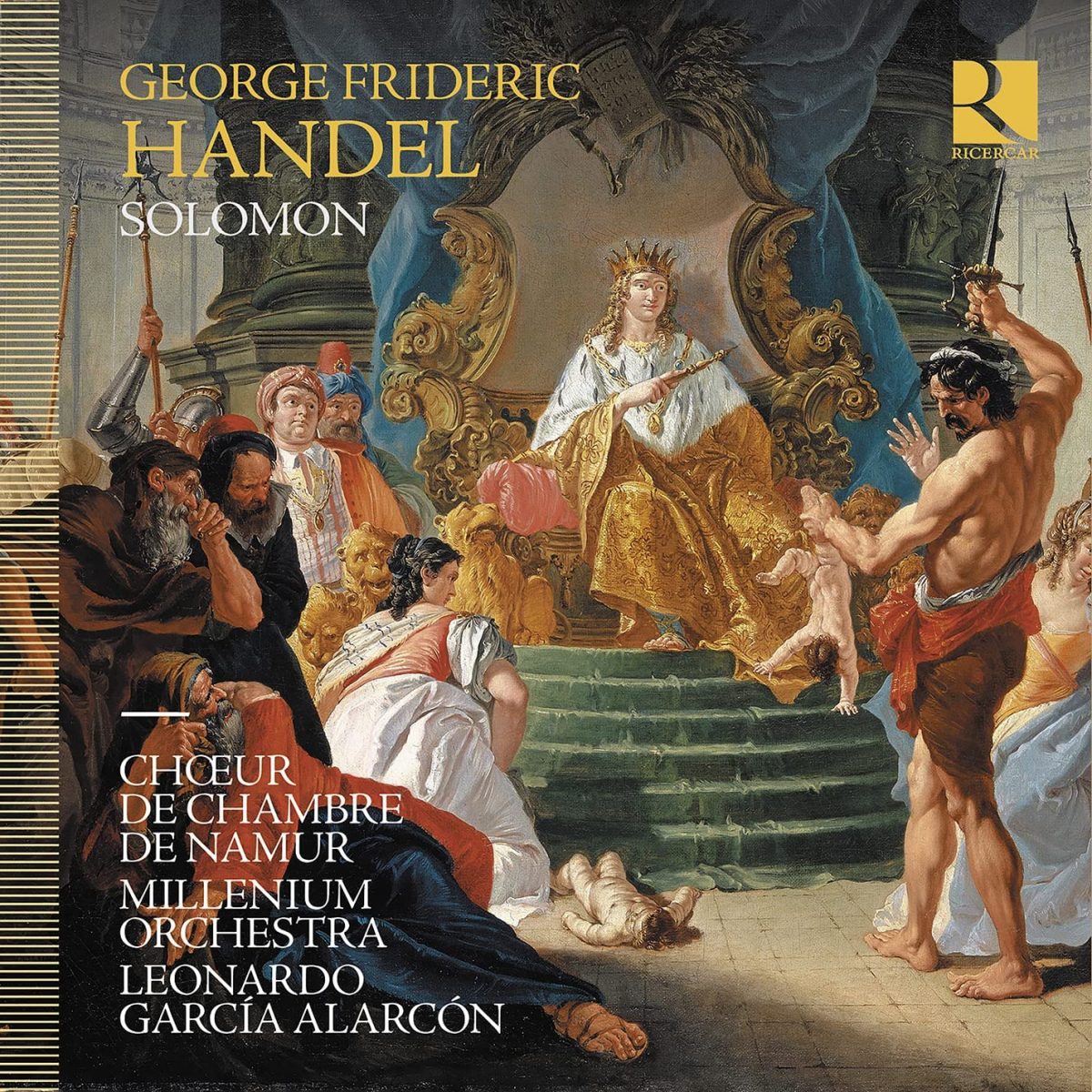Choeur de Chambre de Namur, Millenium Orchestra, directed by Leonardo García Alarcón
152:08 (2 CDs)
Ricercar RIC 449
By 1748 Handel was becoming increasingly affected by age, yet for one last time he managed to complete two oratorios for the forthcoming season, Solomon, first given at Covent Garden in March 1749 and the contrasting Susanna, premiered the previous month. If Handel was feeling the effects of old age by the time he came to compose Solomon, the oratorio shows no sign of it, being one of the most infectiously exuberant works he had composed since his early Italian sojourn.
Solomon is unusual in several respects. Although it ostensibly has a biblical setting, writers have not been slow to find metaphor in its anonymous libretto. Not the least of them is that for Solomon we might read George II, a view advanced by the writer of the notes for the present set and one not so far removed from Christopher Hogwood’s suggestion that the work is a pageant, a celebration of Georgian England. That was an idea modified and expanded to include political discourse in the scholarly essay by Ruth Smith that accompanies Paul McCreesh’s outstanding Archive recording (1998).
Whatever the intentions of the work or otherwise, it was not especially successful for reasons that do not include the quality of the music, much of which can be accounted as being some of the greatest Handel wrote. One conceivable explanation is that the work is less religious in tenor than some of the other oratorios. While the opening numbers praise God on the occasion of the completion of the Temple, the second scene is a glorification of human love between Solomon and his Queen (or just one of them; he is said to have had 700 wives, not to mention 300 concubines!), a celebration expressed in ecstatic terms not least by the Queen (‘On my bosom as he lay, when he call’d my charms divine’) and here given added sensual allure by the quasi-coquettish performance of soprano Gwendoline Blondeel. This was not the kind of thing to which Handel’s oratorio audiences were accustomed and it is perhaps unsurprising that Solomon not only was dropped quickly from the London repertoire, but never made it to the provincial festivals that voraciously lapped up Handel oratorios. Act 2 is largely given over to further eulogies to Solomon, this time within the context of praising his wisdom, illustrated by the story of the two harlots seeking his judgment. This episode is the dramatic core of the work and Handel drew on his long operatic experience to create splendidly differentiated portrayals of the women, the mother in deeply touching terms, the pretender in brittle, shallow utterances. It is perhaps regrettable that the present recording uses the same sopranos as for Solomon’s queen and the Queen of Sheba, though since both are outstanding it does ensure this pivotal episode is heard to the best advantage. Indeed the wonderful pastoral simplicity of the mother’s siciliano enchantingly sung by Ana Marie Labin is one of the set’s highlights. Labin is also a radiant Queen of Sheba in act 3, also largely devoted to praise of Solomon, this time as a mentor of the queen. Not until the overwhelming double chorus ‘Praise the Lord’, one of Handel’s very grandest does God get much of a look in during this act. Incidentally, like McCreesh but not Eliot Gardiner, who moves ‘Praise the Lord’ to the final number, Alarcón correctly keeps it in the published order, where it makes more sense following Zadok’s preceding aria.
Following on from his superb Semele, Alarcón’s Solomon is magnificent. A live performance given in Namur in July 2022, it is from the outset characterised by an irresistible joie de vivre in which contemplation and sensitivity are also given due recognition. Not the least of reasons for its success are the excellent orchestral playing (the legato playing of the strings is ravishing) and the quite magnificent choral singing of the Namur Chamber Choir, now surely the finest of its kind anywhere. The big choruses with brass and timpani are overwhelming in their impact, particularly given some truly thunderous, yet precise timpani playing. There is no weak link among the soloists. Countertenor Christopher Lowrey is an outstanding Solomon (a role Handel wrote for a female alto), encompassing the many aspects of the role in a commanding performance. Andreas Wolf brings unusual precision and a magnificently black bass to the role of the Levite, while American-born tenor Matthew Newlin copes well if not flawlessly with the demanding writing Handel gave to Zadok the High Priest. Mention has already been made of the two outstanding sopranos, but I must return to Labin to praise her outstanding technique and in particular her impressive chest notes and trill, extended, deep and beautifully articulated. Suffice it to say that is not emulated by the other singers, but ornamentation is generally stylishly applied, if conservative in conception. The superfluous addition of an archlute to the continuo is here not too damaging, it being kept more under control than is often the case.
While not displacing the McCreesh recording, which features an outstanding Solomon in Andreas Scholl, there is a special life-enhancing quality about Alarcón’s Solomon that makes it irresistible, essential listening for anyone that loves this music and a must-hear for those yet to fall under its spell.
Brian Robins
